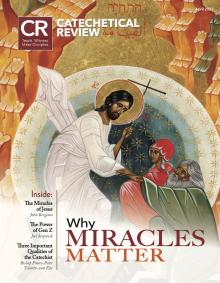Pope St. John Paul II explicitly linked his Theology of the Body (TOB) catechesis[i] with the synod that he convoked to explore “the tasks that Christ gives to marriage and to the Christian family” (TOB 1:5). In his post-synodal document, Familiaris Consortio, he states, “To bear witness to the inestimable value of the indissolubility and fidelity of marriage is one of the most precious and most urgent tasks of Christian couples in our times.” In that same section of Familiaris Consortio, he specifically mentions the modern mentality that “openly mocks the commitment of spouses to fidelity,” and he calls on the whole Church “to reconfirm the good news of the definitive nature of that conjugal love that has in Christ its foundation and strength.”[ii]
St. John Paul II sensed an urgent need to uphold the complete fidelity and absolute indissolubility of marriage because he clearly understood that the most fundamental truths of the Gospel are at stake in these issues. He understood that the inherent dignity of the human person and our vocation to sacrificial, Christlike love are at stake in these issues. Ultimately, he understood that the issues of fidelity and indissolubility ask us whether we believe the Good News that, despite our concupiscence, humans are capable of unconditional love for an entire lifetime on account of our redemption in Jesus Christ. Conversely, St. John Paul II saw temptations to infidelity and divorce as manifestations of our concupiscence, with calls to change the doctrines of our faith on these issues representing a tragic capitulation to sinfulness and human frailty in the face of life’s difficulties.
The previous installment of this series presented the interpersonal meaning of the unitive aspect of marriage embedded in St. John Paul II’s reflections on marital consent. Interpreted through the lens of TOB, marital consent uniquely affirms the worth of the person by declaring, “I acknowledge you as my spouse and give myself to you fully and unconditionally all the days of my life. Being with you in this way is worth the gift of my whole life because you are worth the gift of my whole life. I renounce all others to be with you and you alone in this way because you are utterly unique and irreplaceable and worth sacrificing all others.”
To continue that theme, this installment of the series focuses on the fidelity (“I renounce all others to be with you and you alone”) and indissolubility (“all the days of my life”) required to live out this proclamation of worth in the daily life of the couple. We will also consider the spiritual truths at stake in these issues.
The rest of this online article is available for current Guild members.
This article is from The Catechetical Review (Online Edition ISSN 2379-6324) and may be copied for catechetical purposes only. It may not be reprinted in another published work without the permission of The Catechetical Review by contacting [email protected]


















